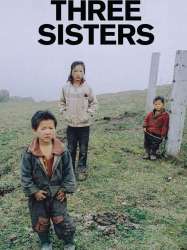Crude Oil is a chinois film of genre Documentary directed by Wang Bing (王兵)
Crude Oil (2008)
採油日記, Cǎi yóu rì jì

If you like this film, let us know!
Length 14h
Directed by Wang Bing (王兵)
OriginChine
Genres Documentary
Themes Environmental films, Films about the labor movement, Documentary films about environmental issues, Documentary films about technology, Documentaire sur le monde du travail
Rating70%










Crude Oil (simplified Chinese: 采油日记; traditional Chinese: 採油日記; pinyin: Cǎi yóu rì jì) is a 2008 Chinese documentary film directed by Wang Bing. Filmed in the Inner Mongolian portion of the Gobi Desert, it follows a group of oil field workers as they go about their daily routine.
Like Wang's debut feature — the nine-hour Tie Xi Qu: West of the Tracks — Crude Oil is notable for its extreme length, running 840 minutes (14 hours). The original plan called for a 70-hour film, but Wang felt compelled to exert additional editorial control and reduced the work to its present length. The director himself came down with severe altitude sickness and left the location three days into the one-week shoot; his crew completed the remainder without him.
Crude Oil premiered (in a video installation setting) at the 2008 International Film Festival Rotterdam, where it received a "Special Mention" for "its dispassionate expose of the hardship of human labour which is the basis of economic progress." The project was commissioned by the IFFR, with additional support from the Hubert Bals Fund. It had its Asian premiere at the 2008 Hong Kong International Film Festival. Its North American premiere was at The Los Angeles Film Festival in June 2009, with screenings held in Gallery 6 at the Hammer Museum.
Synopsis
Filmé dans la partie de Mongolie-Intérieure du Désert de Gobi, Wang Bing suit un groupe de travailleurs sur un champ pétrolifère.Comments
Leave comment :
Suggestions of similar film to Crude Oil
There are 10 films with the same director, 8965 with the same cinematographic genres, 1729 films with the same themes (including 2 films with the same 5 themes than Crude Oil), to have finally 70 suggestions of similar films.If you liked Crude Oil, you will probably like those similar films :
 , 9h11
, 9h11Directed by Wang Bing (王兵)
Origin Chine
Genres Documentary
Themes Films about the labor movement, Documentaire sur le monde du travail
Rating80%





The first portion, "Rust," follows a group of factory workers in three state-run factories: a smelting plant, an electric cable factory and a sheet metal factory. Workers of all three are hindered by sub-standard equipment, hazardous waste, and a lack of safety precautions. Perhaps even worse, the declining need for heavy industry results in a constant shortage of raw materials, leaving the workers idle and concerned for their future.

The Light Bulb Conspiracy (2010)
, 1h15Genres Documentary
Themes Environmental films, La mondialisation, Films about the labor movement, Documentary films about business, Documentaire sur l'altermondialisme, Documentary films about environmental issues, Documentary films about historical events, Documentary films about technology, Documentaire sur le monde du travail
Actors Casey Neistat
Rating79%





Un historique de cette stratégie commerciale et industrielle visant à limiter la durée de vie de certains produits ou appareils est relaté à travers plusieurs exemples particulièrement significatifs.

Fengming: A Chinese Memoir (2007)
, 3h6Directed by Wang Bing (王兵)
Origin Chine
Genres Documentary
Themes Documentary films about historical events, Documentaire sur une personnalité
Rating74%





Caught up the fervor of the Chinese Revolution, He abandoned her plans to study at university and took a job at the Gansu Daily newspaper. Her husband, fellow journalist Wang Jingchao, wrote several critical essays at the height of the Hundred Flowers Campaign. With the launch of the subsequent Anti-Rightist Movement, Wang was attacked for these statements, and He was condemned by association. The two were sent to separate labor camps, where Wang eventually died. He Fengming was released, briefly imprisoned again during the Cultural Revolution, and finally rehabilitated. In the early 1990s she published a memoir, My Life in 1957.

The State of the World (2007)
, 1h45Directed by Chantal Akerman, Wang Bing (王兵), Pedro Costa, Apichatpong Weerasethakul
Genres Drama, Documentary
Actors Jenjira Pongpas, Babu Santana
Rating59%





Six réalisateurs, six regards sur l'état du monde. Leur rencontre crée un nouveau prisme de réflexion dynamique et radical, un espace pour interroger l'avenir.

Dead Souls (2018)
, 8h15Directed by Wang Bing (王兵)
Origin France
Genres Documentary
Rating78%





En Chine, des survivants, du Laogai (camp de rééducation) de Jiabiangou, proche du désert de Badain Jaran, emprisonné après la fin de la campagne des Cent Fleurs, puis frappés par la famine qui a touché la Chine à la fin des années 1950, évoquent leurs souvenirs.

Bitter Money (2018)
, 2h32Directed by Wang Bing (王兵)
Origin Chine
Genres Documentary
Rating69%





Des jeunes gens quittent leur village du Yunnan pour aller travailler dans des ateliers textiles dans la ville de Huzhou à 150 km de Shanghai.

Voices of Transition (2012)
, 1h5Origin France
Genres Documentary
Themes Environmental films, La mondialisation, Films about the labor movement, Documentary films about business, Documentary films about environmental issues, Documentary films about technology, Documentaire sur le monde du travail, Disaster films
Rating75%





Using interviews and overlays of graphics and text, the film presents the current problems facing industrial agriculture. It explores why in the interviewees' view the current industrial model is not up to the task of feeding the world's people. According to the film every calorie of energy contained in a food source currently takes between 10 and 20 calories of crude oil in the production of fertilizers and transportation to produce, leading to a strong dependence of the cost of food on oil prices. As a result of peak oil and increasing oil prices this dependence will lead to ever increasing food prices. According to the film, this dependence already represents a significant weak-spot in the global food supply chain. Additionally, agriculture is already responsible for 40% of greenhouse gas emissions, contributing to climate change. Furthermore, the film argues that the overuse of inorganic fertilizers has been responsible for the loss of soil fertility and threatens the complete loss of usable soil within the next decades through soil erosion and sinking crop yields. These effects, according to the film, can only be partly mitigated by the increased use of those same fertilizers. The loss of workplaces, the concentration of land in the hands of a few (allegedly a farm closes every 23 minutes in France) as well as the dependence on large corporations are enumerated as side effects of the industrialisation of agriculture since the 1920s. Companies, such as Monsanto and Bayer, control everything from seed stock to fertilizers and the necessary chemical mixes for hybrid plants, thereby controlling the entire supply chain. The film argues that this development was supported through subsidies from the World Bank. Interviews with Vandana Shiva, the founder of the Transition Towns movement Rob Hopkins and various agricultural experts serve to argue this viewpoint. The dependence on crude oil is illustrated through the example of the wholesale food market in Rungis.

Ta'ang (2016)
, 2h28Directed by Wang Bing (王兵)
Origin Chine
Genres Documentary
Rating67%





Le documentaire est consacré à l'ethnie des Ta'ang qui vit entre la Birmanie et la Chine.

Three Sisters (2012)
, 2h33Directed by Wang Bing (王兵)
Origin France
Genres Documentary
Rating72%





Le film suit pendant plusieurs mois le quotidien de trois sœurs, âgées de 4, 6 et 10 ans, dans un petit village de montagne de la province du Yunnan. D'abord livrées à elles-mêmes tandis que leur mère a quitté le foyer et que leur père est parti en ville pour chercher du travail, ce dernier emmène ensuite les deux plus jeunes avec lui avant de revenir au village.

'Til Madness Do Us Part (2014)
Directed by Wang Bing (王兵)
Origin Japon
Genres Documentary
Themes Medical-themed films, Films about psychiatry, Films set in psychiatric hospitals
Rating78%





Le film suit pendant 3 mois les patients d'un hôpital psychiatrique du Yunnan ; spécifiquement ceux de l'étage pour hommes, mais aussi un patient en permission de sortie et de retour chez ses parents.
 Connection
Connection